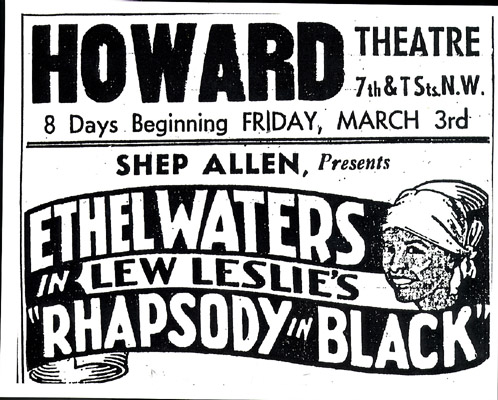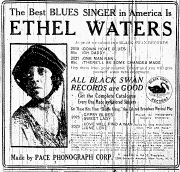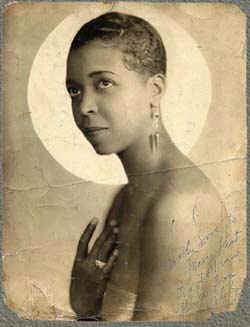This advertisement appeared in the Chicago Defender, the nation's most widely read black newspaper. "Ethel Waters," advertisement, Chicago Defender, Nov. 5, 1921, p. 7.

- Toshiko Akiyoshi
- Geri Allen
- Andrews Sisters
- Angela Andrews
- Lil Harden Armstrong
- Dorothy Ashby
- Pearl Bailey
- Beverly Barkley
- Karen Briggs
- Suzanne Brooks
- Ruth Brown
- Blanche Calloway
- Diane Cameron
- Betty Carter
- Joan Cartwright
- Kim Clarke
- Gloria Coleman
- Alice Coltrane
- Sasha Daltonn
- Dorothy Donegan
- Ella Fitzgerald
- Gloria Galante
- Rita Graham
- Jace Harnage
- Billie Holiday
- Bertha Hope
- Shirley Horn
- Lena Horne
- Alberta Hunter
- Jus' Cynthia
- Sandra Kaye
- Emme Kemp
- Vinnie Knight
- Lavelle
- Peggy Lee
- Abbey Lincoln
- Melba Liston
- Gloria Lynne
- Tania Maria
- Marian McPartland
- Carmen McRae
- Mabel Mercer
- M'zuri
- Sandy Patton
- Trudy Pitts
- Cheryl Porter
- Shirley Scott
- Nina Simone
- Bessie Smith
- Dakota Staton
- Carol Sudhalter
- Monnette Sudler
- Sarah Vaughn
- Dinah Washington
- Ethel Waters
- Mary Lou Williams
Ethel Waters was born on October 31, 1896, in Chester, PA., to a 12 year old mother, Louise Anderson, who had been raped by a white man, John Waters. Although she was raised by her maternal grandmother, she took her father's surname. Reared in poverty, she left school at the age of 13 in order to support herself through domestic housework. She died on September 1, 1977, in Chatsworth, California. She was an American singer and actress who brought black urban blues into the mainstream.
Waters was the first black Superstar, an innovator who opened all the theatrical doors hitherto closed to black performers of her day, to attain the towering position she reached as a headliner. She fought hard and long to achieve solo star status in the white world of vaudeville, night clubs, Broadway theater, radio, films and television. More than any other black performer of the century, Ethel Waters was a woman of the theater, and the celebrity she attained in maturity as an actress tended at times to overshadow-at least in memory-the importance of her accomplishments and influence as a singer.
Her talents defied categorical limits. She was the fountainhead of all that is finest and most distinctive in jazz and popular singing. Widely imitated during the 30's and 40's, one still hears echoes of Ethel Waters in many singers who came after her. Joe Turner, Bing Crosby, Ivie Anderson, Lee Wiley, Mildred Bailey, Connie Boswell, and Ella Fitzgerald have acknowledged their debt to her. Her range soared easily from a low, chest tone to a high, clear head voice: on records she sang from a low E to high F, just over two octaves, and on "Memories of You" she hits a spectacular high F sharp. Her diction was clear and impeccable, coloring the lyrics with the proper emotion necessary to express the feelings she wanted to convey.
Born October 31, 1896, in Chester, Pennsylvania, her eighty year life was a turbulent one filled with low valleys and high peaks. In her autobiography, His Eye is on the Sparrow, she frankly detailed the squalor of her sordid childhood and early struggles. Her singing career began with amateur night performances in Philadelphia, then slowly moved in the black theater circuit, where she was billed as "Sweet Mama Stringbean."
She began recording in 1921 for the Black Swan label, continuing with that company through 1924. When she introduced "Dinah" at the famous Plantation Club (Broadway and 50th Street) in New York City in 1925, she met with such success that she was signed by Columbia Records, for whom she was to make many of her most famous recordings during the next decade. Her career continued to escalate in such black shows as Africana, The Blackbirds of 1928 (and 1930) and Rhapsody in Black. In 1929, she made her film debut in the new talking films, singing "Am I Blue?" and "Birmingham Bertha" in On with the Show, remade a few years later as Forty-Second Street. More. . .

.jpg)

